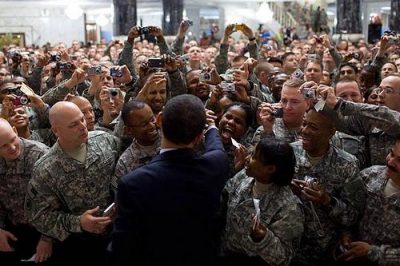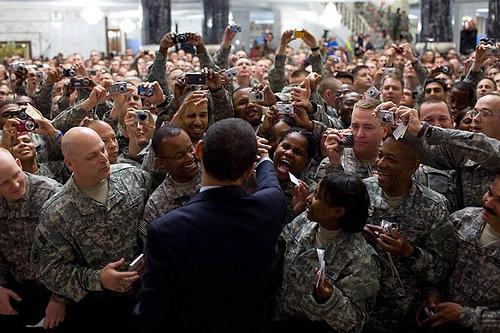Near the end of George Bush’s eight years in the White House, the president and his Iraqi counterpart, Prime Minister Nouri al-Maliki, shared a big problem. Both of them wanted U.S. troops to stay in Iraq, but both faced widespread domestic opposition to the U.S. occupation.

Obama is bringing the troops home, but will he leave behind the military contractors? Photo by U.S. Army.
Feeling the heat, they settled on a “status of forces agreement” (SOFA) calling for full withdrawal of all 150,000 or so U.S. troops and all Pentagon-paid contractors by Dec. 31. In his first 18 months in office, President Obama did significantly reduce the numbers of troops in Iraq, down to about 50,000 by August 2010. But there it stuck. A year later, more than 40,000 U.S. troops were still occupying Iraq. The number of Pentagon-paid contractors still there was even higher—as of March, more than 64,000.
Even worse, the Obama administration continued to pressure the weak and corrupt Iraqi government to renegotiate the SOFA and “invite” the U.S. to keep troops in Iraq for the foreseeable future: a permanent occupation in all but name.
At the end of the day, none of those efforts worked. The official reason for not agreeing to keep 5,000 to 10,000 troops in Iraq was the refusal of the Iraqi government to guarantee U.S. soldiers immunity from criminal prosecution, but the real reason was that anti-war public opinion in Iraq and the U.S. was simply too strong. Al-Maliki certainly hoped some U.S. troops would remain, to help his unpopular government stay in power; Obama was under pressure from some in the Pentagon determined not to “lose” the supposed “gains” the occupation had achieved. But neither Iraq’s parliament nor the American people were prepared to allow thousands of U.S. soldiers to continue occupying Iraq. It was a stunning victory for those who have fought for peace all these years.
But. We’re not out of the woods entirely. Remember those contractors? Turns out the SOFA drafters were cleverer than anyone knew. The agreement said all Pentagon-paid military contractors had to leave by the end of this year, but didn’t mention those paid by the State Department. So guess which U.S. government agency is taking over the check-writing to pay thousands of U.S.-hired mercenaries to stay in Iraq for the long haul?
President Obama campaigned on a promise to end the war in Iraq, calling it a “dumb war.” So why did his administration try so hard to continue the occupation? It seems the strategic reasons that began during the Bush administration—the real causes underneath the fallacious claims that Iraq had weapons of mass destruction or responsibility for 9/11—didn’t go away. Control of oil contracts, strategic reach in a vital region, access to bases, surrounding Iran: All remain operative, whoever is in the White House.
The war cost way too much in Iraqi and U.S. deaths and in our tax dollars. We paid almost $50 billion just this year for this war. That’s enough to provide health care for 24 million children for a year, or to create and fund new, green jobs for a million workers—maybe including those thousands of soldiers supposed to be on their way home.
The U.S. role in the Iraq war has gotten smaller, but it sure isn’t over. We need to bring home all U.S. personnel and dollars. It’s really “dumb” if we don’t. And we still can’t afford dumb wars.
“Reprinted with permission from Sojourners, (800)714-7474, www.sojo.net.”
